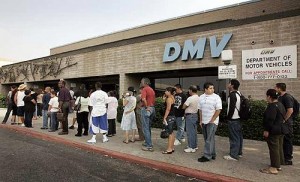 A lot of my performance on stage relies on misdirection–making you focus on the unimportant things. To do this, I need to have your attention before I can misdirect it, so I spend a good deal of time studying the psychology of distraction and attention. The other day I came across an interesting article by David Maister, Ph.D., on waiting in lines. I thought it would be good info to know the next time you are at the DMV.
A lot of my performance on stage relies on misdirection–making you focus on the unimportant things. To do this, I need to have your attention before I can misdirect it, so I spend a good deal of time studying the psychology of distraction and attention. The other day I came across an interesting article by David Maister, Ph.D., on waiting in lines. I thought it would be good info to know the next time you are at the DMV.
He concluded that the amount of time we are actually in line does not really affect how long we perceive the wait to be.
Eight factors can add to the perceived wait time. Here’s a list of what makes the waits seem longer.
1. The wait feels longer when we are unoccupied. (For example, hotels put mirrors in elevators because people will look at themselves, and the ride will seem faster.)
2. We just want to START! You get seated at a restaurant, get the menu, get drinks, order, etc. The wait is very long, but we feel better when things get rolling.
3. Anxiety increases the perceived wait time. The more you focus on the wait, the worse it is.
4. We want to know when the wait will end. A wait where the doctor’s office that gives an estimated wait time will feel shorter than an unknown wait time.
5. A unforeseen wait seems longer than one we expect. If the wait makes sense, then it seems shorter.
6. Waiting seems longer when it is unfair. We have all had the experience of a line that is poorly managed: who gets to go in next?
7. We can wait when we perceive a value. I am not a big iPhone fan, but you have to admit that people perceive a value.
8. Being with someone else makes it seem shorter. Other people can help engage you and take your mind off the wait.

 Combining psychology, showmanship, and misdirection Nathan Thomas creates an interactive experience where the audience alternates between laughter and deep astonishment. His psychological illusions cross the line from possible to impossible, providing a real sense of mystery. Sleight of Mind is unforgettable, an experience unlike any other.
Combining psychology, showmanship, and misdirection Nathan Thomas creates an interactive experience where the audience alternates between laughter and deep astonishment. His psychological illusions cross the line from possible to impossible, providing a real sense of mystery. Sleight of Mind is unforgettable, an experience unlike any other.